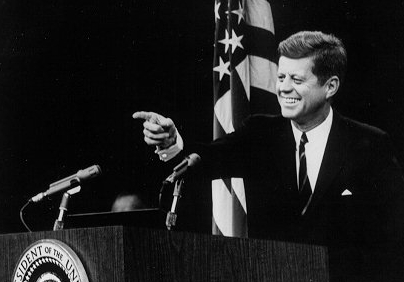The JFK 100
Oliver Stone's Portrayal of John F. Kennedy


I never realized Kennedy was so dangerous to the establishment.(1)This is the core conviction in service to which all of Oliver Stone's theories are mobilized. But is it true?
One of the ironies surrounding Stone's film is that, thanks to the JFK Records Act of 1992, which was motivated by concerns about government secrecy inflamed by allegations made in JFK, a massive amount of information on the Kennedy presidency has unexpectedly come to light; but it does not support Oliver Stone's portrayal of JFK as a threat to the establishment. Rather, it confirms what historians tended to think all along: that Kennedy was very deeply a part of that establishment.
As scholars like Gus Russo have documented, Kennedy was not, as Oliver Stone claims, at war with his own Central Intelligence Agency. He maintained intimate ties with the men who ran the CIA, and with the assistance of his closest advisor -- his brother, the Attorney General, Robert Kennedy -- ran the Agency with an iron hand, particularly after the spectacular fiasco at the Bay of Pigs, for which the President and the CIA must share the blame. Rather than stomp down on CIA covert operations, as Stone would have us believe, Kennedy became one of their most enthusiastic behind-the-scenes advocates and instigators.(2)
Those who insist, as Oliver Stone does, that JFK was a threat to the military fail to comprehend the limitations of the presidency's power. While it can never be known how John F. Kennedy would have acted with regard to Vietnam had he lived to serve a second term, one thing is certain: the course Oliver Stone insists the President would have taken, that of complete withdrawal, would have been not merely controversial, but unthinkable. It would have meant nothing less than a complete betrayal of our overseas allies, whom Kennedy had pledged innumerable times to defend. It is impossible to imagine Congress allowing such a move; it would have meant political suicide for any who supported it.
Oliver Stone's unapologetic romanticism of John F. Kennedy reaches its climax during JFK's trial scene, in which, through the mouth of actor Kevin Costner, the filmmaker states:
We have all become Hamlets in our country -- children of a slain father-leader whose killers still possess the throne. The ghost of John F. Kennedy confronts us with the secret murder at the heart of the American dream.(3)For Oliver Stone, it seems that all evils can be traced to the moment in time when John F. Kennedy's heart stopped beating. After Kennedy came the horrors of Vietnam, the turmoil of a nation divided, and the national shame of Watergate.
But the longings for our mythical American Camelot are every bit as illusory as all nostalgic yearnings for a Golden Age. It was John F. Kennedy's administration that brought US forces into Vietnam, and there is no telling how JFK would have responded to the challenges his successor, Lyndon B. Johnson, had to face. National divisions hardly began during the LBJ years; the civil rights movement, for example, began gathering momentum during Kennedy's term in office. And certainly, the President's covert initiative to assassinate the leader of a sovereign state with which the US was officially at peace, Cuba's Fidel Castro, is a moral and legal offense that puts the dirty tricks of the Nixon White House into some perspective.
Certainly, it is not the intention of this author to smear John F. Kennedy or belittle his memory. The hope JFK inspired and the vision he expressed for America and the world live on, and will surely continue to do so. Despite the personal revelations that have tarnished his image, there can be no doubt that the man possessed a quality that ensures him a place in the hearts and minds of future generations.
As historian Herbert S. Parmet writes:
[C]all him a schemer, a hawk masquerading as a man of peace, a conservative who adopted liberal rhetoric, an idealist hampered by his father's 'robber baron' mentality, an elegant, sophisticated gentleman of principle who couldn't wait to tumble the first available skirt -- he became a legend and symbol for the masses all over the world. In the homes of the poor, in America and elsewhere, his picture hangs on walls along with those of Jesus Christ, Martin Luther King, and Franklin D. Roosevelt.(4)But a threat to the establishment? That's something Oliver Stone is going to have to prove with hard evidence, not conjecture and rhetoric.
John F. Kennedy was the establishment, sharing its dreams and ambitions as well as its vulnerabilities and harsh realities. That's one of the reasons we love him.
NOTES:1. Oliver Stone and Zachary Sklar, JFK: The Book of the Film (New York: Applause, 1992), p. 110. All quotations are from the shooting script and may vary slightly from the finished motion picture.
2. Gus Russo, Live by the Sword (Baltimore: Bancroft, 1998), pp. 13-84, 419-51.
3. Oliver Stone and Zachary Sklar, JFK: The Book of the Film (New York: Applause, 1992), p. 176. All quotations are from the shooting script and may vary slightly from the finished motion picture.
4. Herbert S. Parmet, Jack: The Struggles of John F. Kennedy (New York: Dial, 1980), p. xii.